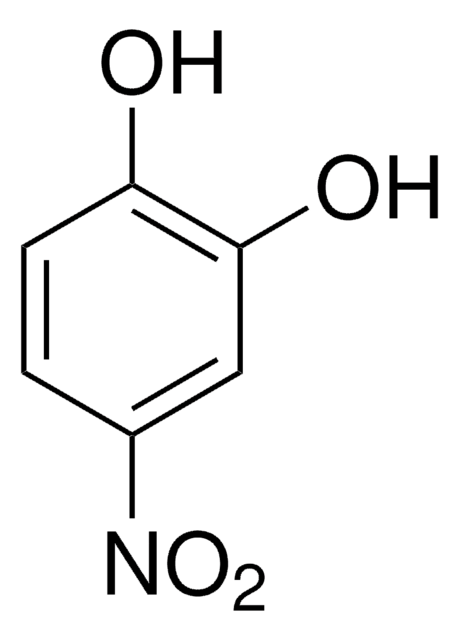D131
3,5-Dinitrocatechol
solid
Synonym(s):
3,5-Dinitro-1,2-benzenediol, OR-486
About This Item
Recommended Products
biological source
synthetic (organic)
Assay
≥98% (HPLC)
form
solid
color
yellow
mp
168-170 °C
solubility
H2O: slightly soluble 0.17 mg/mL
45% (w/v) aq 2-hydroxypropyl-β-cyclodextrin: 2.8 mg/mL
0.1 M HCl: slightly soluble
DMSO: soluble
aqueous buffer pH > 5: soluble
ethanol: soluble
storage temp.
2-8°C
SMILES string
Oc1cc(cc(c1O)[N+]([O-])=O)[N+]([O-])=O
InChI
1S/C6H4N2O6/c9-5-2-3(7(11)12)1-4(6(5)10)8(13)14/h1-2,9-10H
InChI key
VDCDWNDTNSWDFJ-UHFFFAOYSA-N
Gene Information
human ... COMT(1312)
Application
Biochem/physiol Actions
Quality
Caution
Storage Class Code
11 - Combustible Solids
WGK
WGK 3
Flash Point(F)
Not applicable
Flash Point(C)
Not applicable
Personal Protective Equipment
Certificates of Analysis (COA)
Search for Certificates of Analysis (COA) by entering the products Lot/Batch Number. Lot and Batch Numbers can be found on a product’s label following the words ‘Lot’ or ‘Batch’.
Already Own This Product?
Find documentation for the products that you have recently purchased in the Document Library.
Our team of scientists has experience in all areas of research including Life Science, Material Science, Chemical Synthesis, Chromatography, Analytical and many others.
Contact Technical Service







